Sir Harrison Birtwistle: Songs 1970-2006
Instrumental and vocal techniques are intertwined in the music of Harrison Birtwistle: he often treats the voice instrumentally and his instrumental writing has vocal characteristics. Many of his works for small ensembles, with or without voices, occupy this common ground, his highly individual style juxtaposing the static and the violently dynamic and intersecting with his fondness for ritual and myth – not least a recurrent concern with the figure of Orpheus. This recording presents some of these relatively neglected pieces, recorded live in the presence of the composer, who also talks about his songs in interview.
Listen To This Recording:
- Nenia: The Death of Orpheus
- Orpheus Elegies: No. 1
- Orpheus Elegies: No. 2
- Orpheus Elegies: No. 11 Sonnet I
- Orpheus Elegies: No. 5
- Orpheus Elegies: No. 14 Sonnet III
- Orpheus Elegies: No. 12
- Orpheus Elegies: No. 25
- Orpheus Elegies: No. 20 Sonnet V
- Fantasia III
- Nine Settings of Lorine Niedecker: I There’s a better shine
- Nine Settings of Lorine Niedecker: II My friend tree
- Nine Settings of Lorine Niedecker: III Along the river
- Nine Settings of Lorine Niedecker: IV Hear where the snow-grave is
- Nine Settings of Lorine Niedecker: V How white the gulls
- Nine Settings of Lorine Niedecker: VI My life by water
- Nine Settings of Lorine Niedecker: VII Paul when the leaves fall
- Nine Settings of Lorine Niedecker: VIII O late fall marsh
- Nine Settings of Lorine Niedecker: IX Sleep’s dream
- Frieze I
- Lullaby
- Songs by Myself: I O light set the flame in amber
- Songs by Myself: II I lean against a shade
- Songs by Myself: III Cold statements
- Songs by Myself: IV Steps
- Songs by Myself: V This silence before light
- Interview
- Cantus Iambeus



Fanfare Magazine :
‘Birtwistle’s songs are…audacious, surprising, endlessly inventive, and often gravely beautiful.…all the performances burn with a sense of missionary zeal, while the recorded sound and documentation—especially the long Birtwistle interview—are predictably superb. In short, here’s an ideal introduction to a small but obviously important and deeply personal corner of a great composer’s output.’
—Jim Svejda, Fanfare Magazine, January/February 2016
Opera News :
‘…welcome and excellent release…
Of the twenty-six small Birtwistle puzzle pieces that make up Orpheus Elegies, the eight selections here include three with voice. Countertenor Johannes Euler intones his Rilke texts gravely, with the glittery assistance of oboist Doga Sacilik and harpist Jasmin-Isabel Kühne.
For Nenia: The Death of Orpheus, soprano Alice Rossi steps into the formidable shoes once occupied by Jane Manning and Jan DeGaetani. She gives a go-for-broke performance in the wide-ranging intervals. She must portray Orpheus, Euridice and a narrator almost simultaneously, altering unpitched speaking with song, at times syllable by syllable, and she convincingly creates the illusion of multiple performers. Birtwistle treats only the later, grisly part of the myth. He controls the drama with intensity, as does Conductor Stefan Asbury. Rossi also sings Songs by Myself, a bit of a fiftieth-birthday lark wherein Birtwistle sets his own poetry. With languorous low flute over solo strings and piano, the five brief songs emerge as Birtwistle’s distilled version of Ravel’s Madagascar Songs. Sophia Körber sings nine settings of Lorine Niedecker, a Wisconsin poet whose appeal remains elusive. But Körber sings the poetry, which is nearly aphoristic, in a forward and communicative way that is preferable to Amy Freston’s cool accuracy on an earlier recording. Körber’s freedom in the early song pays dividends in the new musical expression of the ninth song, where the pitches of a two-note rocking figure gently pull apart under the vocal line, marked to be sung “not phrased.” Cellist Aram Yagubian is a fine partner, the two artists making the exact length of each song seem inevitable.’
—William R. Braun, Opera News, November 2015
American Record Guide :
‘The early Nenia: The Death Of Orpheus is sung, shrieked, and chanted by the young soprano Alice Rossi, who plays three roles in a polyphonic rendering of Orpheus’s dismemberment. (An obsession with Orpheus is a Birtwistle signature.) She is sensational here and hauntingly subdued in the 2006 ‘Lullaby’. This Orpheus piece is not to be confused with the 2004 Orpheus Elegies, a gentler work graced by the crystalline harp of Jasmin-Isable Kuhn and the high-altitude voice of countertenor Johannes Euler. Whatever one makes of Birwistle’s music, he gets excellent performances. … The briefest items, Nine Settings of Lorine Niedecker for cello and soprano, are only a minute or two each. A little bit of Birtwistle goes a long way, and these highly concentrated pieces are the most striking items here. Rossi, impressive as ever, brings these tiny bursts of dark feeling to life, accompanied by cellist Aram Yagubian, who plays with ghostlike eloquence. … People who admire Birtwistle will want this; it offers mostly unfamiliar repertory and first-rate performers—not only the singers and instrumental soloists, but the Kuss Quartet and the superb Das Neue Ensemble, led by modern-music specialist Stefan Asbury.’
—Jack Sullivan, American Record Guide, January 2016
MusicWeb International :
‘Overall this is a valuable addition to the Birtwistle discography. If the vocal numbers must usually yield to the existing competition, each of them still serves the music well. The sound is very good, and the notes are helpful and comprehensive, with a fuller version of the interview with Birtwistle. The programme overall is appealing […] the sequence of vocal and instrumental pieces is very satisfying. It begins and ends with the most substantial works and there’s much fascinating variety in between. It is a disc replete with that “ancient and modern” feeling we so often get with this great composer, each fiercely concentrated offering a missive from that prelapsarian world to which he alone now holds the key.’
—Roy Westbrook, MusicWeb International
Classical Net :
‘[The album] offers compelling accounts of the works and illustrates the ways in which Birtwistle has tended to use instruments vocally and the voice as an instrument. It’s a blend of almost neoclassical penetration and impersonal abstraction that all these performers clearly understand well.
It is perhaps sparseness, crystalline clarity, which will strike you first. None of the players or singers rushes to “present” the music – although the energy exuded in Cantus Iambeus is almost tangible. All the performers’ own fresh focus and sense of purpose are allowed to convey the music’s own meaning, not any kind of push. Soprano Sophia Körber and cellist Aram Yagubian in the Lorine Niedecker settings epitomize this concentration. […]
The acoustics of the two locations used for these live recordings are responsive; they allow the characteristics of both voices and instruments to emerge naturally yet pointedly, with clarity. […] If Birtwistle’s music is of any interest to you, or if you are an avid collector and want to explore these lesser-known corners of his output, this CD will not disappoint.’
—Mark Sealey, Classical Net
Gramophone Magazine :
‘the performance is admirable and all the recordings, taken from an 80th-birthday celebration of Birtwistle’s music in Germany, are satisfyingly polished and atmospheric.’
—Arnold Whittall, Gramophone Magazine, August 2015
Sunday Times :
‘Birtwistle identifies songwriting — Dowlandishly — with melancholia, and compares word-setting to the setting of jelly.’
—Sunday Times
Forum Opera :
‘Avec les Songs by Myself de 1984, la soprano italienne Alice Rossi trouve déjà matière à déployer un chant mettant davantage en valeur ses qualités vocales, dans cinq mélodies qui, malgré leur extrême brièveté (la totalité du cycle dure à peine huit minutes), relèvent nettement moins de l’impasse et suscitent bien davantage d’émotions.
A Sophia Körber revient d’interpréter les textes de la poétesse américaine Lorine Niedecker (1903-1970), à peu près aussi sibylline que sa compatriote Emily Dickinson. Composées en 2000, ce cycle réunit neuf mélodies plus courtes encore, puisqu’elles oscillent entre trente-cinq secondes et une minute trente. Bien que minimaliste, le mariage de la voix au violoncelle n’en est pas moins évocateur. Sophia Körber est rejointe par Sarah Lewark pour une berceuse à deux voix a cappella (2006), d’une grande pureté.
Plus réussies encore, les Orpheus Elegies de 2004, conçues pour un contre-ténor. On n’entend Johannes Euler que dans trois des cinq plages, puisque sur les vingt-six « miniatures » qui forment l’œuvre, seules huit ont été retenues ici, dont cinq purement instrumentales (c’est apparemment le chanteur qui met en marche le métronome dans deux d’entre elles, nous dit-on). Il se dégage des poèmes de Rilke ainsi interprétés une réelle magie.
Des trois pièces instrumentales qui complètent le disque, on retiendra surtout la dernière, le superbe et mystérieux Cantus Iambeus, où Stefan Asbury conduit avec une précision rigoureuse Das Neue Ensemble.’
English translation:
‘With her 1984 collection, Songs by Myself, the Italian soprano Alice Rossi already found ample opportunity to showcase her vocal qualities in five melodies that, despite their extreme brevity (the entire cycle lasts barely eight minutes), are far less of a dead end and evoke considerably more emotion.
Sophia Körber then interprets the texts of the American poet Lorine Niedecker (1903-1970), almost as enigmatic as her compatriot Emily Dickinson. Composed in 2000, this cycle comprises nine even shorter melodies, ranging from thirty-five seconds to one minute and thirty seconds. Although minimalist, the combination of voice and cello is nonetheless evocative. Sophia Körber is joined by Sarah Lewark for a lullaby for two voices a cappella (2006), of great purity.
Even more successful are the 2004 Orpheus Elegies, composed for a countertenor. Johannes Euler is heard on only three of the five tracks, since of the twenty-six “miniatures” that make up the work, only eight have been selected here, five of which are purely instrumental (apparently, it is the singer who starts the metronome on two of them, we are told). A true magic emanates from Rilke’s poems thus interpreted.
Of the three instrumental pieces that complete the disc, the last, the superb and mysterious Cantus Iambeus, stands out, where Stefan Asbury conducts Das Neue Ensemble with rigorous precision.’
—Laurent Bury, Forum Opera